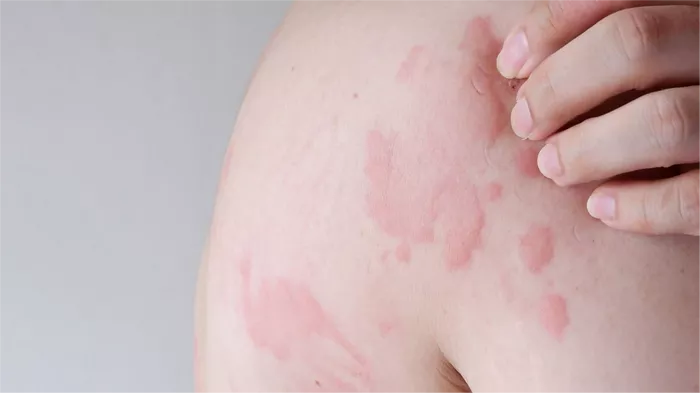Hives, medically known as urticaria, are a common skin condition characterized by raised, itchy welts on the skin. While typically red or pink in color, the appearance of purple hives can be alarming and may indicate specific underlying causes that require attention and treatment. The emergence of purple hives can be attributed to several factors, ranging from allergic reactions to more serious health conditions. To comprehend why hives may turn purple, it’s essential to explore the various causes, associated symptoms, and potential treatment options.
What Are Hives?
Hives are a skin reaction triggered by the release of histamine and other chemicals in response to an allergen or other stimulus. This reaction causes small blood vessels to leak fluid, leading to the characteristic welts or bumps on the skin. Hives can vary in size and shape and often appear suddenly. They can be acute (lasting less than six weeks) or chronic (lasting more than six weeks).
Why Do Hives Turn Purple?
Purple hives, or hives that appear purple or bluish in color, can indicate a more severe allergic reaction or a deeper involvement of blood vessels beneath the skin’s surface. The color change may result from increased blood flow or changes in the tissue due to inflammation or other physiological responses.
Common Causes of Purple Hives
1. Allergic Reactions: One of the most common causes of hives, including those that turn purple, is an allergic reaction to food, medications, insect stings, or environmental allergens like pollen or pet dander. In severe cases, such reactions can lead to anaphylaxis, a life-threatening condition requiring immediate medical attention.
2. Autoimmune Disorders: Certain autoimmune conditions, such as lupus or vasculitis, can cause inflammation of blood vessels (vasculitis) leading to purple-colored hives. These conditions require specialized medical management to address the underlying immune dysfunction.
3. Infections: Viral or bacterial infections can trigger hives as part of the body’s immune response. In some cases, such as in vasculitic syndromes associated with infections like hepatitis or HIV, the presence of hives can involve blood vessel inflammation and subsequent discoloration.
4. Physical Stimuli: Exposure to physical triggers like cold, heat, pressure, or sunlight (known as physical urticaria) can also cause hives, including purple-colored ones, due to the complex interactions of skin and blood vessels in response to these stimuli.
5. Medications: Certain medications, particularly antibiotics, NSAIDs (nonsteroidal anti-inflammatory drugs), and blood pressure medications, can induce hives as a side effect. Purple hives can signify a more severe reaction in some cases.
Identifying Symptoms of Purple Hives
Apart from their distinct color, purple hives share common symptoms with typical hives, including:
- Itching, which can be mild to severe
- Swelling around the affected area
- Redness or discoloration
- Raised, welt-like bumps on the skin
In more severe cases, additional symptoms such as difficulty breathing, facial swelling, or dizziness may occur, indicating a potentially life-threatening allergic reaction that requires immediate medical attention.
Diagnostic Process
Diagnosing the underlying cause of purple hives involves a comprehensive evaluation by a healthcare professional. This typically includes:
- Patient History: Gathering information about recent exposures to potential triggers, including foods, medications, or environmental factors.
- Physical Examination: Observing the appearance and distribution of hives on the skin, including any associated symptoms.
- Allergy Testing: Conducting tests, such as skin prick tests or blood tests, to identify specific allergens that may be contributing to the hives.
- Additional Investigations: Based on clinical findings, additional tests like blood work, imaging studies, or skin biopsies may be warranted to assess for underlying conditions like autoimmune diseases or infections.
Treatment Options
The treatment of purple hives focuses on relieving symptoms and addressing the underlying cause:
- Antihistamines: Over-the-counter or prescription antihistamines can help reduce itching and inflammation associated with hives.
- Avoidance of Triggers: Identifying and avoiding triggers, whether allergens, physical stimuli, or medications, is crucial in preventing recurrent episodes.
- Medications: In severe cases or those involving an autoimmune component, corticosteroids, immune-modulating medications, or biologics may be prescribed to manage inflammation.
- Emergency Management: For anaphylactic reactions, immediate administration of epinephrine (EpiPen) and emergency medical attention are necessary.
Preventive Measures
Preventing purple hives often involves lifestyle modifications and vigilance:
- Maintain a diary of suspected triggers and avoid exposure to known allergens.
- Wear protective clothing or use sunscreen to shield against physical triggers like sunlight or cold.
- Communicate with healthcare providers about potential adverse reactions to medications.
When to Seek Medical Attention
While many cases of hives are self-limited and resolve with symptomatic treatment, certain warning signs necessitate urgent medical evaluation:
- Difficulty breathing or swallowing
- Swelling of the face, lips, or tongue
- Fainting or dizziness
- Rapid onset or widespread distribution of hives
Conclusion
The appearance of purple hives signifies a potentially serious skin reaction that warrants prompt evaluation and management. Identifying and addressing the underlying cause, whether allergy-related, autoimmune, or infectious, is key to effective treatment and prevention of recurrent episodes. If you or someone you know experiences purple hives or accompanying symptoms, seek medical attention promptly for appropriate diagnosis and care.
Related Topics:


























